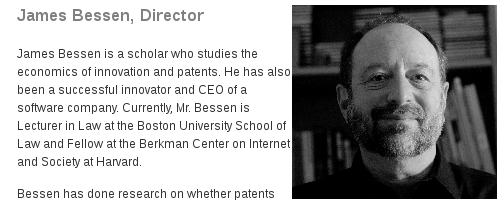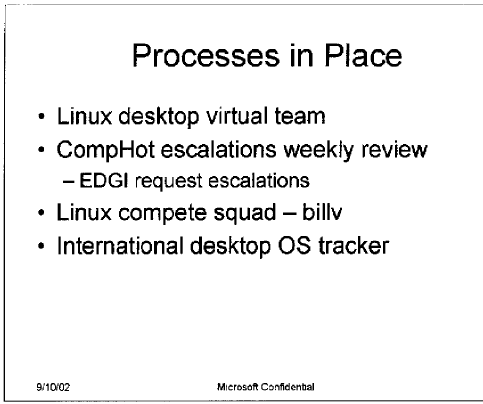11.17.11
Posted in Finance, Microsoft, Patents at 12:16 pm by Dr. Roy Schestowitz
Who is Microsoft joking anyway?

Summary: People who bet their money on Microsoft want to see the company split and the company’s growing business seems to be extorting the competition in dubious ways
HAD Microsoft quit the mobile efforts (which would make total economic sense), then in that particular area it would have qualified as a patent troll, based on the definition.
Microsoft is still a fairly large company (yet small compared to HP or IBM). It operates in many areas and profits only in few, notably Office and Windows (to a decreasing extent). Monopoly tends to do that. Monopoly abuse tends to shield it.
So, Microsoft might be splitting itself into a patent troll (euphemism “licensing”) and other parts, at least if shareholders get their way. There are several articles right now about the shareholders’ meeting. A toned-down article from Microsoft’s ‘news’ site says that “Microsoft Corp shareholders filed out of the software giant’s annual meeting grumbling that they did not get to ask more questions in their once-a-year opportunity to quiz Chairman Bill Gates and CEO Steve Ballmer.
“The gathering broke up with only a smattering of applause from 450 or so in attendance, while a handful of shareholders angrily shouted for more time to ask questions, after a strictly enforced 15 minutes.
“”Why can’t they answer questions for another hour?” said Bill Parker, a shareholder from Cashmere, Washington, a two-hour drive over the Cascade mountains.”
“Microsoft might be splitting itself into a patent troll (euphemism “licensing”) and other parts, at least if shareholders get their way.”When one is reluctant to be grilled, he or she typically has something to hide (or spin).
As one person in USENET put it: “Only because Microsoft have been buying back their shares keeping the price artificially high. No wonder shareholders are revolting.” We wrote about those buybacks before.
Over at OpenBytes, Tim points out that:
Microsoft is in my view, merely flinging mud at the wall in the hope something will stick, the only place where “success” seems to come easily is with their patent aggression (which now may be set to change after we finally get an idea of Microsoft claims). Apple has a logo “Theres an app for that”, maybe the only logo Microsoft will have in the future will be “Theres a patent for that” as it moves further away from trying to compete with its own products and merely uses its patent portfolio to make a buck.
The basic point is, Microsoft is unable to come up with new products. It relies on old cash cows that it broke the law to put in their current state. Right now it tries to make up a new cash cow through racketeering. Maybe if it spins that off as a separate company (like Nokia/MOSAID) it will manage to dodge regulators. The company is clearly flirting with serious antitrust violations. █
Permalink
 Send this to a friend
Send this to a friend
Posted in Novell, OpenSUSE at 12:05 pm by Dr. Roy Schestowitz
Under water

Summary: OpenSUSE fails to get much press coverage while the same goes for Novell under Attachmate
YESTERDAY I was having an argument with someone in the comments — someone who was not a troll but a Novell backer. The crux of the argument was, are Novell and SUSE getting more obscure over the years based on press coverage and activity? Judging by metrics that are numeric (e.g. number of news reports about Novell/Attachmate), there is certainly a decline. The same goes for SUSE, whose community seems to be shrinking based on the level of activity in their sites. A lot of SUSE staff left as well, unlike the many Novell employees who were simply laid off. This included the whole Mono team.
Mono applications continue to come from existing or former Novell staff, as this item of news helps show, but much of Mono is now in Xamarin, which does not get press coverage either (not since it launched). After Ubuntu dumped Mono from the default installation there is going to be an ever-shrinking installedbase for Mono. Also, SUSE has announced no major deals in a long time, so we know that the Microsoft cash infusion has not quite worked out.
So, there is a new release of ‘Open’ SUSE (developed by staff which is partly paid by Microsoft) and this got some coverage from fairly mediocre blogs and hardly any news sites. Andreas Jaeger, a SUSE employee, explained what was changing and SJVN, a longtime SUSE fan, wrote about it along with his colleague. There is more PR from paid staff and the OpenSUSE site, but it’s nothing like it used to be years ago when we covered OpenSUSE and releases were more frequent. This represents stagnation. When coverage comes mostly from the project’s site itself and maybe some Linux sites and staff/member blogs, then OpenSUSE is a niche. With the exception of low-profile news blogs, we have found almost no news about the release. Well, we wrote about this earlier in the week and last week. There is one sort of derivative called Balsam (a form of Ballnux), but it’s just a payware equivalent.
If we were missing some mainstream coverage about this release, be sure to point this out, but thus far (less than a day after the release) it is mostly SUSE blogs and OpenSUSE announcements that inform people about this release. The new HOWTOs even refer to old versions and Linux blogs sometimes say nothing about the new release, unless they are affiliated with Novell/SUSE. To quote that last example: “openSUSE 12.1 is officially released today. This is a major milestone both for its users and developers, mainly because of new GNOME 3.2, systemd integration, and many other exciting features.”
Those features are hardly OpenSUSE-specific. We have not really found reviews of this release yet, but here is a new video and one newly-uploaded oldie from Novell. The company along with the distribution it bought is just forever declining. For SUSE to have as much impact as Mint, well… it will need to escape the Attachmate/Microsoft shackles. █
Permalink
 Send this to a friend
Send this to a friend
Posted in GNU/Linux, Google, Microsoft, Patents at 11:48 am by Dr. Roy Schestowitz

Summary: Microsoft is trying to kill Google in nefarious ways and this has ramifications for Linux, even for open standards and free codecs
THE increasing dominance of Android is one that we write about in our daily links. There is generally not much we can add to the news and not much to contradict, either. But Android is also under attack from angles that Google’s Chris DiBona is addressing now (the “malware” FUD) and then there is the patent FUD. It’s something that we specialise in.
As usual, with support from Microsoft lobbyist Florian Müller, the Microsoft booster Matt Rosoff tries to incite against Google over a remark about patent lawyers. Check out this terrible headline. The article contains talking points of the Microsoft lobbyists, trying to portray Google as the patent aggressor. For instance:
His point echoes Google’s stand on the patent wars happening in the mobile space, but Google plays the patent game as well for key inventions like its search algorithms.
This is spin because Google never used patents offensively and it openly speaks out against patents. Microsoft has hired some lobbyists to try portraying Google as a hypocrite and a bully for merely defending itself from the likes of Microsoft.
On the MPEG front, Google has been developing a replacement codec (developed by acquisition) and LWN does not neglect to credit the Ogg people as well. In essence, both strands of codec development strive to set our multimedia free — free in the sense that we need not get the permission of a patent troll called Larry Horn (head of the Apple- and Microsoft-backed MPEG-LA) to play back our video and audio that we ourselves create. Microsoft lobbyists like Florian Müller are pushing for MPEG-LA’s agenda and against free codecs. As for
Monty from Xiph.org, he is named one of the most influential people in the 2005 European debate about software patents. The article opens as follows:
While the talks at the 2011 GStreamer conference mostly focused on the multimedia framework itself—not surprising—there were also some that looked at the wider multimedia ecosystem. One of those was Christopher “Monty” Montgomery’s presentation about Xiph.org, and its work to promote free and open source multimedia. Xiph is known for its work on the Ogg container format (and the Vorbis and Theora codecs), but the organization has worked on much more than just those. In addition, Montgomery outlined a new strategy that Xiph is trying out to combat one of the biggest problems in the free multimedia world: codec patents.
It is truly a problem because multimedia exists everywhere, from phones to TVs. Europe does not suffer from this to the same extent that the US and Japan suffer from it. But upon export it can complicate things. According to this new report, UK judges (who are also lawyers) are making the system here in Europe worse:
UK Judges Think US Makes It Too Hard To Get Patents, Lower Patentability Bar To Show How It’s Done
[...]
It’s bad enough that naturally-occurring genomic sequences are being patented at all – sequences that certainly weren’t invented by anyone. But allowing those patents without even requiring “proof of specific, credible, and substantial utility at the time of filing” is just insane: it will open the floodgates for even more speculative filings on DNA sequences in the hope that someone, someday will come up with a use for them. Except that if they did, they’d presumably be hit with a patent infringement suit. So how does that promote innovation?
Those patent lawyers (and judges) are really quite the epidemic in the software world and the president of the FFII warns of:
European Commission “Patents in standards” conference fueled by large companies for swpats and undefined RAND ur1.ca/5ucd5
Yes, as usual. Microsoft tends to back those. It also sends its paid lobbyists there. Apple is rarely listed as we repeatedly stress. In fact, the push for software patenting cannot quite be attributed to Apple, just Microsoft and selected allies like SAP and Nokia in Europe. It does not mean that Apple is innocent though. As the Independent (British paper) puts it:
Apple has also distinguished itself this year by tying up hundreds of vague software ideas in patents and suing anyone it thinks infringes them, which is one of several reasons why all the big technology companies are locked in furious patent court battles with each other.
The competition from Linux is now forcing Apple to lower its prices, at least according to speculative assessments:
It doesn’t take a rocket scientist to figure out that Apple — until now the runaway market share champ in this nascent niche — is finally facing legitimate competition at ridiculously attractive price points.
It is being reported that tablets running Android, especially ones from Samsung and Amazon, are selling or going to sell very well. It is likely that Apple just recognises what’s coming and prepares to price “Apple”-branded products based on value and not brand value. Apple increasingly colludes with Microsoft against Android and we see this in the CPTN and Nortel arrangements. █
Permalink
 Send this to a friend
Send this to a friend
Posted in Patents at 11:30 am by Dr. Roy Schestowitz

Summary: More academic insight and more anecdotal evidence of the backlash against the existing patent laws and practices
The silly, meaningless measures that we see of innovation as function of patents continue to come from press outlets like the The New York Times, which in turn cites a “report by Thomson Reuters, published on Tuesday [and] tries to draw a more accurate link between corporate patent filings and real innovation. It does so by measuring not only the number of patents a company files, but also the influence, global reach and success of its patents.”
Innovation should not be quantified in these terms. Profit and patents are something better used as indicators of monopoly power, which is what patents are all about at the end of the day. To measure innovation properly, other yardsticks are definitely needed. Watch how Doom 3 source code fails to arrive due to patents. It was in the news yesterday and it’s a fine example of where patents do a lot of harm when geometric knowledge can be shared. There is a better — and for a change academic — work that helps shed light on the effects of patents. It was covered by CNN yet again (as before) and this time it focused on patent trolls. Bessen and his wonderful group published another paper which got the attention of those who keep abreast of the patents debate. Here is the original (Boston University) where the abstract states: “In the past, non-practicing entities (NPEs) — firms that license patents without producing goods — have facilitated technology markets and increased rents for small inventors. Is this also true for today’s NPEs? Or are they “patent trolls” who opportunistically litigate over software patents with unpredictable boundaries? Using stock market event studies around patent lawsuit filings, we find that NPE lawsuits are associated with half a trillion dollars of lost wealth to defendants from 1990 through 2010, mostly from technology companies. Moreover, very little of this loss represents a transfer to small inventors. Instead, it implies reduced innovation incentives.”
IDG covered this too. Notice the opening paragraphs:
For those of us who follow the tech industry closely, patents are a touchy subject lately thanks to all the litigation going on over software patents.
This is particularly true in the mobile arena, where companies including Apple and Microsoft have been especially enthusiastic in their use of patents as leverage over their competitors.
They do this because they are losing to Android/Linux.
Here is another IDG article, this one bearing the headline “Patent Trolls Cost Businesses $80 Billion Per Year, Study Finds”. To quote: ““Non-practicing entities” (NPEs) is the polite name given to patent trolls by Boston University School of Law researchers James Bessen, Jennifer Ford, and Michael Meurer, whose paper, “The Private and Social Costs of Patent Trolls” (PDF), will soon be published in the journal Regulation.
“Whereas such firms once helped enable technology markets and boost the profits small inventors could earn from their inventions, that’s no longer the case, the authors argue. Rather, today’s NPEs assert patents “on an unprecedented scale,” they write, involving thousands of defendants every year in hundreds of lawsuits.
“The researchers studied the effect of patent lawsuits on defendants’ wealth by examining the stock price of those companies around the time the lawsuits in question were filed. After factoring out market trends and random factors, they found that between 1990 and 2010, NPE lawsuits are associated with half a trillion dollars in lost wealth to defendants.”
Here is an example of a legal case that has been concluded after no less than 2 years (i.e. very expensive process):
A Portland, Ore.-based company that sued two multiple listing service software vendors for patent infringement has lost a two-year court battle, with a U.S. District Court Judge dismissing its claim against one of the vendors and invalidating the patent in question.
As the president of the FFII puts it in relation to another case:
ProSoftnet, creator of IBackup.com and IDrive.com, is now defending itself against patent trolls
There is actually a press release about it, which is a testament to the sad state this whole system is in. To quote:
Cloud Storage Pioneer Pro Softnet Faces Most Disruptive Patent Attack to Date
Pro Softnet, an independently owned and operated online backup and cloud storage company that provides service to over 800,000 subscribers through its popular IBackup and IDrive products, is now in the midst of defending itself against the largest patent attack it has yet faced brought on by a non-practicing entity, or NPE. With several new and exciting services in the cloud sharing space scheduled for release in the first quarter of 2012 – the pending lawsuit has the potential to interrupt growth for this pioneering company.
WIPO propaganda is trying to justify its existence, quite frankly as usual, while many genuine companies with real products (and no patent lawyers) are suffering. This leaves development and innovation crashing down and deterring participation. More and more people are starting to really get it. The patent system is on shaky grounds. It does not serve innovators. █
Permalink
 Send this to a friend
Send this to a friend
Posted in Patents at 11:12 am by Dr. Roy Schestowitz
Rich men’s club not all fine and dandy with software patents

Summary: The man behind Amazon expresses his apparent dislike and seemingly strong antagonism towards software patents
IN PAST writings about Amazon we emphasised the fact that the company had become part of the software patents epidemic not just in the United States but in Canada and Europe as well. Companies of that scale tend to favour patents in general because patents are a form of protectionism to those already in a position of power.
Interestingly enough, based on this new post that cites an article, Amazon might have just done something right by issuing an unofficial statement against software patents. To quote the company’s chief:
The Wired story included several other interesting details. Bezos isn’t a fan of patents, for instance, despite the fact he has personally applied for patents in the past and Amazon is famous for its 1-Click shopping patent.
“For many years, I have thought that software patents should either be eliminated or dramatically shortened,” Bezos said. “It’s impossible to measure the toll they’ve had on the software industry, but on balance, it has been negative.”
If he had to give up the 1-Click patent to make this happen, Bezos said he would.
This is certainly a step forward. Amazon has already agreed to pay Microsoft for unnamed software patents relating to GNU/Linux servers and Kindle (now based on Android), so will we ever see Amazon withdrawing from all that nonsense? Based on this new summary from the OSI, there is new activity relating to investigation of Microsoft’s patent extortion. Swapnil Bhartiya explains why Microsoft’s claims over Android are “bogus” and this would also apply to Android-based tablets from Amazon. The article says that “it turns out that Microsoft was playing bluff with Android players. Their game was to threaten to sue and most companies would rather throw a bone at the dog than to enrage in a dirty dog fight. Microsoft continued to show the bones it was collecting. Since the deals were confidential now one ever got to know how ‘concrete’ are Microsoft’s patent claims.”
Well, now we know that Microsoft was bluffing, thanks mostly to B&N. MOSAID, Nokia, Microsoft, other patent trolls and Nortel-like purchases should be brought forth as more evidence that Microsoft is distorting the market using extortion tactics. Pamela Jones’ good analysis [1, 2] receievd a lot of links and it provides a good summary of the case against Microsoft’s tactics. This is an antitrust matter which we’ll deal with later on. █
Permalink
 Send this to a friend
Send this to a friend
Posted in Antitrust, GNU/Linux, Google, Microsoft at 8:58 am by Dr. Roy Schestowitz

Summary: The “Compete” euphemism is back and it is being sneakily used to deprive Google of the right to actually compete
TECHRIGHTS is proud to be the exclusive host of a lot of verified EDGI evidence. Based on court exhibits that we put out there for sites like Slashdot to make widely known, one term Microsoft uses to describe such anti-GNU/Linux initiatives is "Compete". It’s a funny term to be using as it’s a euphemism for anti-competitive tactics, wherein the company with a monopoly essentially bribes companies (or governments) to lure them away from the competition. Based on this new report, Microsoft now uses the same tactics to defend the Office monopoly:
Microsoft is so riled up over Google Apps that it has a team called Google Compete offering major inducements to convince customers to stay with Office, according to defectors and the search company itself.
At this week’s Google Atmosphere conference, several defectors who had adopted Google cloud apps said that they were approached by members of the Google Compete team, who had sought to persuade them to stay with Microsoft. If argument failed to convince them, then the team was willing to offer other inducements.
Google should complain about this because for a Redmond-based company with a monopoly in the office suites market there are special rules that Microsoft clearly does not obey. Under the banner “Compete”, Microsoft is being anti-competitive, derailing all efforts to actually compete. █
Permalink
 Send this to a friend
Send this to a friend
Posted in Microsoft, Novell at 8:42 am by Dr. Roy Schestowitz

Summary: Subjects we will focus on and invitation for suggestions
The deal that Novell signed on November 2nd (2006) is about to expire in 6 weeks or so. SUSE has renewed this deal but under different circumstances and clauses. It was less to do with patent assurances and more to do with injecting money into the only GNU/Linux distribution Microsoft makes money from (the other 3 have perished). Our plan is to continue to focus on patent aggression from Microsoft (e.g. against Android) and also from Apple, which started attacking Android/Linux with patents last year. Additionally, we are going to look at anti-competitive practices that merit government intervention. If there are any more area that we need to cover, please suggest so in the comments. █
Permalink
 Send this to a friend
Send this to a friend
« Previous Page — « Previous entries « Previous Page · Next Page » Next entries » — Next Page »
Further Recent Posts
- Watchtroll a Fake News Site in Lobbying Mode and Attack Mode Against Those Who Don't Agree (Even PTAB and Judges)
A look at some of the latest spin and the latest shaming courtesy of the patent microcosm, which behaves so poorly that one has to wonder if its objective is to alienate everyone
- The Productivity Commission Warns Against Patent Maximalism, Which is Where China (SIPO) is Heading Along With EPO
In defiance of common sense and everything that public officials or academics keep saying (European, Australian, American), China's SIPO and Europe's EPO want us to believe that when it comes to patents it's "the more, the merrier"
- Technical Failure of the European Patent Office (EPO) a Growing Cause for Concern
The problem associated with Battistelli's strategy of increasing so-called 'production' by granting in haste everything on the shelf is quickly being grasped by patent professionals (outside EPO), not just patent examiners (inside EPO)
- Links 5/1/2017: Inkscape 0.92, GNU Sed 4.3
Links for the day
- Links 4/1/2017: Cutelyst 1.2.0 and Lumina 1.2 Desktop Released
Links for the day
- Financial Giants Will Attempt to Dominate or Control Bitcoin, Blockchain and Other Disruptive Free Software Using Software Patents
Free/Open Source software in the currency and trading world promised to emancipate us from the yoke of banking conglomerates, but a gold rush for software patents threatens to jeopardise any meaningful change or progress
- New Article From Heise Explains Erosion of Patent Quality at the European Patent Office (EPO)
To nobody's surprise, the past half a decade saw accelerating demise in quality of European Patents (EPs) and it is the fault of Battistelli's notorious policies
- Insensitivity at the EPO’s Management – Part V: Suspension of Salary and Unfair Trials
One of the lesser-publicised cases of EPO witch-hunting, wherein a member of staff is denied a salary "without any notification"
- Links 3/1/2017: Microsoft Imposing TPM2 on Linux, ASUS Bringing Out Android Phones
Links for the day
- Links 2/1/2017: Neptune 4.5.3 Release, Netrunner Desktop 17.01 Released
Links for the day
- Teaser: Corruption Indictments Brought Against Vice-President of the European Patent Office (EPO)
New trouble for Željko Topić in Strasbourg, making it yet another EPO Vice-President who is on shaky grounds and paving the way to managerial collapse/avalanche at the EPO
- 365 Days Later, German Justice Minister Heiko Maas Remains Silent and Thus Complicit in EPO Abuses on German Soil
The utter lack of participation, involvement or even intervention by German authorities serve to confirm that the government of Germany is very much complicit in the EPO's abuses, by refusing to do anything to stop them
- Battistelli's Idea of 'Independent' 'External' 'Social' 'Study' is Something to BUY From Notorious Firm PwC
The sham which is the so-called 'social' 'study' as explained by the Central Staff Committee last year, well before the results came out
- Europe Should Listen to SMEs Regarding the UPC, as Battistelli, Team UPC and the Select Committee Lie About It
Another example of UPC promotion from within the EPO (a committee dedicated to UPC promotion), in spite of everything we know about opposition to the UPC from small businesses (not the imaginary ones which Team UPC claims to speak 'on behalf' of)
- Video: French State Secretary for Digital Economy Speaks Out Against Benoît Battistelli at Battistelli's PR Event
Uploaded by SUEPO earlier today was the above video, which shows how last year's party (actually 2015) was spoiled for Battistelli by the French State Secretary for Digital Economy, Axelle Lemaire, echoing the French government's concern about union busting etc. at the EPO (only to be rudely censored by Battistelli's 'media partner')
- When EPO Vice-President, Who Will Resign Soon, Made a Mockery of the EPO
Leaked letter from Willy Minnoye/management to the people who are supposed to oversee EPO management
- No Separation of Powers or Justice at the EPO: Reign of Terror by Battistelli Explained in Letter to the Administrative Council
In violation of international labour laws, Team Battistelli marches on and engages in a union-busting race against the clock, relying on immunity to keep this gravy train rolling before an inevitable crash
- FFPE-EPO is a Zombie (if Not Dead) Yellow Union Whose Only de Facto Purpose Has Been Attacking the EPO's Staff Union
A new year's reminder that the EPO has only one legitimate union, the Staff Union of the EPO (SUEPO), whereas FFPE-EPO serves virtually no purpose other than to attack SUEPO, more so after signing a deal with the devil (Battistelli)
- EPO Select Committee is Wrong About the Unitary Patent (UPC)
The UPC is neither desirable nor practical, especially now that the EPO lowers patent quality; but does the Select Committee understand that?
- Links 1/1/2017: KDE Plasma 5.9 Coming, PelicanHPC 4.1
Links for the day
- 2016: The Year EPO Staff Went on Strike, Possibly “Biggest Ever Strike in the History of the EPO.”
A look back at a key event inside the EPO, which marked somewhat of a breaking point for Team Battistelli
- Open EPO Letter Bemoans Battistelli's Antisocial Autocracy Disguised/Camouflaged Under the Misleading Term “Social Democracy”
Orwellian misuse of terms by the EPO, which keeps using the term "social democracy" whilst actually pushing further and further towards a totalitarian regime led by 'King' Battistelli
- EPO's Central Staff Committee Complains About Battistelli's Bodyguards Fetish and Corruption of the Media
Even the EPO's Central Staff Committee (not SUEPO) understands that Battistelli brings waste and disgrace to the Office
- Translation of French Texts About Battistelli and His Awful Perception of Omnipotence
The paradigm of totalitarian control, inability to admit mistakes and tendency to lie all the time is backfiring on the EPO rather than making it stronger
- 2016 in Review and Plans for 2017
A look back and a quick look at the road ahead, as 2016 comes to an end
- Links 31/12/2016: Firefox 52 Improves Privacy, Tizen Comes to Middle East
Links for the day
- Korea's Challenge of Abusive Patents, China's Race to the Bottom, and the United States' Gradual Improvement
An outline of recent stories about patents, where patent quality is key, reflecting upon the population's interests rather than the interests of few very powerful corporations
- German Justice Minister Heiko Maas, Who Flagrantly Ignores Serious EPO Abuses, Helps Battistelli's Agenda ('Reform') With the UPC
The role played by Heiko Maas in the UPC, which would harm businesses and people all across Europe, is becoming clearer and hence his motivation/desire to keep Team Battistelli in tact, in spite of endless abuses on German soil
- Links 30/12/2016: KDE for FreeBSD, Automotive Grade Linux UCB 3.0
Links for the day
- Software Patents Continue to Collapse, But IBM, Watchtroll and David Kappos Continue to Deny and Antagonise It
The latest facts and figures about software patents, compared to the spinmeisters' creed which they profit from (because they are in the litigation business)
























 Content is available under CC-BY-SA
Content is available under CC-BY-SA